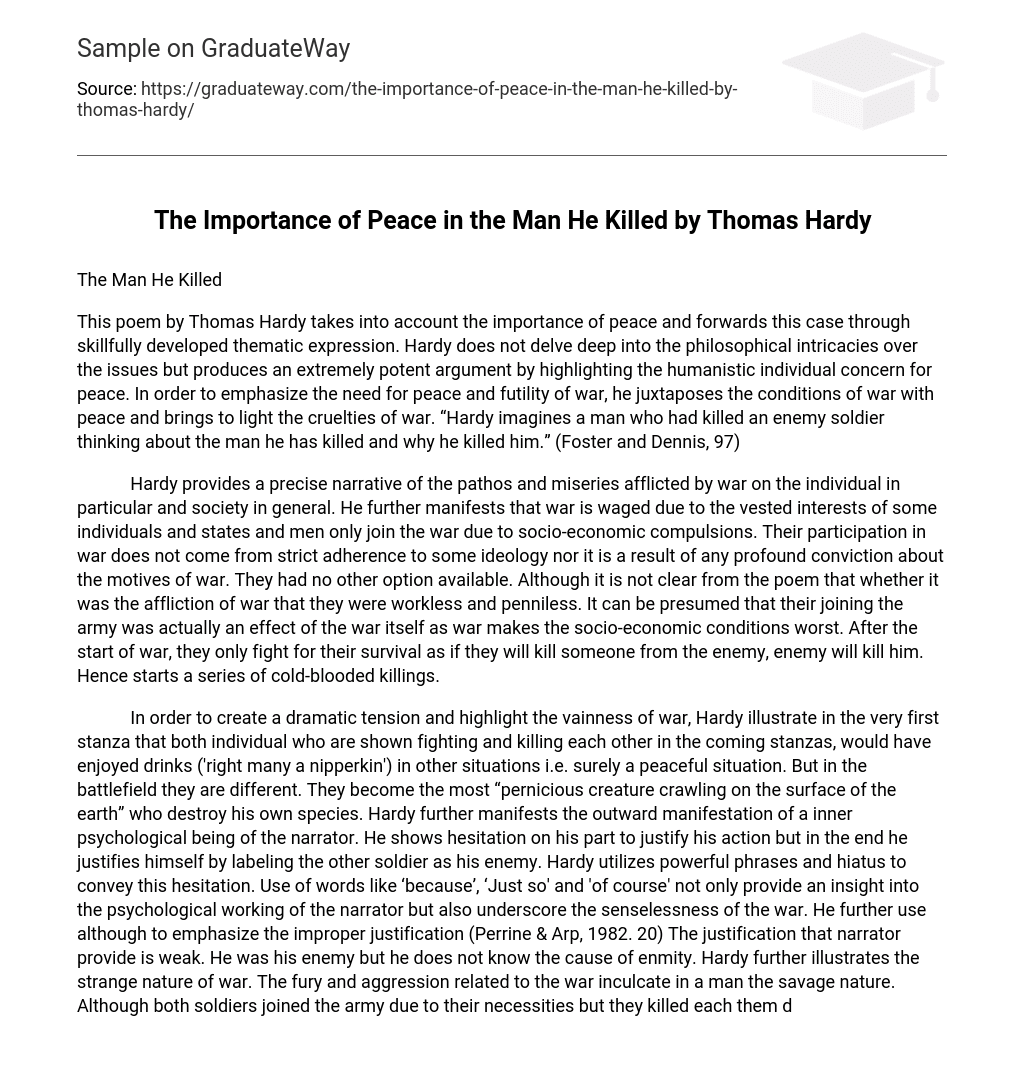The Man He Killed
This poem by Thomas Hardy takes into account the importance of peace and forwards this case through skillfully developed thematic expression. Hardy does not delve deep into the philosophical intricacies over the issues but produces an extremely potent argument by highlighting the humanistic individual concern for peace. In order to emphasize the need for peace and futility of war, he juxtaposes the conditions of war with peace and brings to light the cruelties of war. “Hardy imagines a man who had killed an enemy soldier thinking about the man he has killed and why he killed him.” (Foster and Dennis, 97)
Hardy provides a precise narrative of the pathos and miseries afflicted by war on the individual in particular and society in general. He further manifests that war is waged due to the vested interests of some individuals and states and men only join the war due to socio-economic compulsions. Their participation in war does not come from strict adherence to some ideology nor it is a result of any profound conviction about the motives of war. They had no other option available. Although it is not clear from the poem that whether it was the affliction of war that they were workless and penniless. It can be presumed that their joining the army was actually an effect of the war itself as war makes the socio-economic conditions worst. After the start of war, they only fight for their survival as if they will kill someone from the enemy, enemy will kill him. Hence starts a series of cold-blooded killings.
In order to create a dramatic tension and highlight the vainness of war, Hardy illustrate in the very first stanza that both individual who are shown fighting and killing each other in the coming stanzas, would have enjoyed drinks (‘right many a nipperkin’) in other situations i.e. surely a peaceful situation. But in the battlefield they are different. They become the most “pernicious creature crawling on the surface of the earth” who destroy his own species. Hardy further manifests the outward manifestation of a inner psychological being of the narrator. He shows hesitation on his part to justify his action but in the end he justifies himself by labeling the other soldier as his enemy. Hardy utilizes powerful phrases and hiatus to convey this hesitation. Use of words like ‘because’, ‘Just so’ and ‘of course’ not only provide an insight into the psychological working of the narrator but also underscore the senselessness of the war. He further use although to emphasize the improper justification (Perrine & Arp, 1982. 20) The justification that narrator provide is weak. He was his enemy but he does not know the cause of enmity. Hardy further illustrates the strange nature of war. The fury and aggression related to the war inculcate in a man the savage nature. Although both soldiers joined the army due to their necessities but they killed each them due to over aura surrounding them at the battlefield.
So this poem clearly manifests the pathos and miseries afflicted on mankind socially, economically and psychologically. Hardy had used the twin tools of comprehensiveness and brevity to illustrate the futility of war.
Works Cited
Perrine,L. & Arp, T. Sound and Sense. Harcourt Brace Jovanovich, 1982
Foster, J & Dennis, Gordon. Classic Poetry. Cheltenham: Stanley Thornes. 1997.





